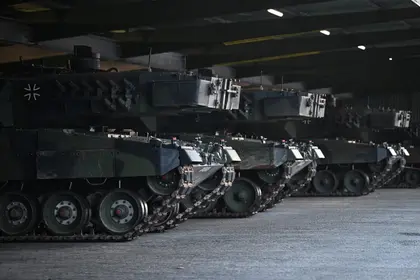The total number of Leopard 1 tanks currently bound for Ukraine is likely to be 165, it has emerged in reports, but there are concerns about their effectiveness in modern combat.
Earlier this week, Western European media outlets reported that 50 Leopard 1 tanks had been purchased by a “secret country” on behalf of Ukraine.
JOIN US ON TELEGRAM
Follow our coverage of the war on the @Kyivpost_official.
It was confirmed later that the 50 used vehicles were in fact purchased by Rheinmetall, one of Germany’s defense industry leaders, from OIP Land Systems, a Belgian company, which had acquired them at “peppercorn” prices some time ago.
- Access the newest Ukraine news items published today.
- See the most recently published Ukraine news reports from today.
Rheinmetall, the German firm that initially designed and built the Leopard 1 40 years ago, announced it would refurbish 30 of the acquired batch for Ukraine as part of a Belgian initiative.
“That should bring to at least 165 the number of Leopard 1s bound for Ukraine,” military materiel specialist and Forbes writer David Axe said yesterday.
The 165 tanks represent the combined current commitment by Germany, Denmark and the Netherlands, as well as the pledge by Belgium, to fund the acquisition and refurbishment of Leopard 1s for Ukraine.
“Just how useful the 1980s-vintage, German-designed tanks will be to Ukraine’s war effort depends on how the Ukrainians choose to use them – and how heavily they upgrade the 40-ton, four-person vehicles,” Forbes’ Axe wrote.

ISW Russian Offensive Campaign Assessment, January 21, 2025
Training of Ukrainian crews began this spring in Germany. In late July, the first 10 Leopard 1A5s arrived in Ukraine, Forbes reported.
Those first tanks might be destined for the Ukrainian army’s new 44th Mechanized Brigade, Axe believes.
“The balance of the initial consignment of at least 135 Leopard 1A5s could equip as many as four battalions – one each for four mechanized brigades. Every subsequent batch of 30 tanks could form a battalion,” Axe noted.
“It won’t be long before the Leopard 1A5 is Ukraine’s most numerous Western-made tank. Kyiv’s forces have received, or soon should receive, 54 Leopard 2A4s, 10 Leopard 2A5s—actually, Swedish versions of that type—plus 21 Leopard 2A6s. They’ve also gotten 14 British Challenger 2s; 31 American M-1A1s are en route,” Axe calculated.
Since the start of Ukraine’s summer offensive and the commitment of new units and Western-provided equipment, geolocated footage shows that Russian forces have destroyed two Leopard 2A4s and two Leopard 2A6s and damaged several of each model, particularly on the heavily fortified southern Ukrainian front.
Axe believes that, due to their abundance and availability, the Leopard 1 and American M-1 are likely to become Ukraine’s main Western tanks, but he sounded a note of caution.
“The much lighter Leopard 1A5 these days is less a tank than it is a mobile gun. Its 105-millimeter gun is accurate and reasonably powerful, but its armor—just 70 millimeters of steel at its thickest – is woefully inadequate for the kind of fighting that occurs every day in Ukraine. If heavily armored Leopard 2s are getting knocked out, Leopard 1s don’t stand a chance… if placed at the front of armored columns for direct assaults on Russian fortifications,” Axe wrote.
“[However, if the Ukrainians] put them behind the armored infantry, from where they safely can bring their long-range firepower to bear, then the aging Leopards might actually do some good,” Axe summed up.
You can also highlight the text and press Ctrl + Enter










